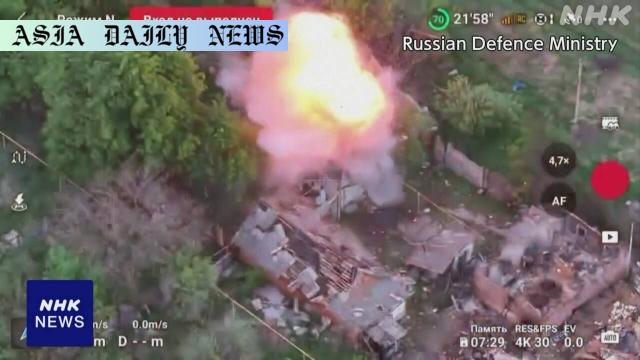Rocket Attack: Russian forces increase offensive with rocket strikes in Sumy, causing casualties and evacuations.
Russian forces intensified rocket attacks near Sumy, Ukraine.
Casualties include 4 dead and 30 wounded, sparking evacuations.
Russia aims to establish a ‘buffer security zone’ at the border.
Ukrainian officials push for stronger sanctions against Russia.

Russian Forces Intensify Attacks in Sumy
On Tuesday, Russian military forces escalated their offensive in the northeastern Ukrainian region of Sumy, situated close to the Russian border. The region came under a barrage of rocket fire, targeting urban areas and causing significant damage to civilian infrastructure. Ukrainian President Volodymyr Zelenskyy confirmed the tragic death toll of four individuals and close to thirty others suffering severe injuries in the latest attack. This surge in armed aggression has forced authorities to evacuate residents from more than 200 settlements as safety concerns mount.
The casualties and displacement underscore the dire situation unfolding in Sumy. Authorities have highlighted that 35,000 people remain stranded in high-risk areas, unable or unwilling to leave, as shelling persists in rapid succession. The humanitarian crisis grows as logistical and financial challenges burden evacuation operations, making it difficult to secure safe passage for thousands.
Russia’s Strategic Buffer Zone
According to the Russian defense ministry, their troops have seized additional settlements approximately 20 kilometers north of Sumy. This move aligns with Russia’s broader objective of creating a strategic ‘buffer security zone’ along its border with Ukraine. Moscow frames these maneuvers as protective measures, though they are widely viewed as aggressive attempts to expand territories under Russian control.
The establishment of such a buffer zone directly undermines Ukrainian sovereignty. With continued attacks, the deliberate targeting of civilian-populated areas raises questions about the disregard for international humanitarian laws. The aggressive expansion strategy appears aimed at consolidating a foothold in Ukraine’s territory, further straining diplomatic efforts to end the conflict.
Humanitarian Crisis and International Dialogue
Beyond casualties and destruction, a significant humanitarian crisis is unfolding in the wider Sumy region. The sheer scale of evacuations throws light on the inescapable reality faced by countless civilians. Over 200 settlements are now under mandatory evacuation orders to protect residents from bombardments. With food, water, and essential supplies becoming increasingly scarce in high-risk areas, the region teeters on the brink of collapse amid the unrelenting offensive.
Amid such dire circumstances, efforts to foster international dialogue have not yielded significant developments. Andriy Yermak, head of Ukraine’s presidential office, recently engaged with U.S. special envoys. Despite calls for stronger actions and sanctions against Russia, Yermak clarified that Moscow’s unwillingness to pursue a ceasefire complicates diplomatic solutions. Statements from Ukrainian leadership have reiterated the urgent need for global solidarity to mitigate civilian harm and hold Russia accountable for ongoing aggression.
Implications for Global Security
The aggression in Sumy represents broader geopolitical ramifications. As the conflict escalates, repercussions extend well beyond Ukraine’s borders. Russia’s intensified push to alter the territorial realities near Sumy presents a direct challenge to international norms and a potential precedent of unchecked aggression. Responses from European and Western allies demand greater cohesion to assert standing commitments to Ukraine’s defense and deter future violations of sovereignty elsewhere in the region.
The focus now shifts toward not only supporting Ukraine’s defense but also amplifying diplomatic pressure to discourage Moscow’s disregard for dialogue. Simultaneously, strategies are required to strengthen emergency humanitarian support for internally displaced populations and curb long-term implications on regional stability.



Commentary
Escalating Conflict in Sumy: A Grim Reality
The recent rocket attacks in the northeastern Ukrainian city of Sumy paint a grim picture of continued aggression that makes peace seem ever more elusive. Russia’s growing offensive, particularly the establishment of a ‘buffer security zone,’ appears to be part of a calculated strategy to weaken Ukraine’s territorial integrity. This concerning pattern lays bare the challenges ahead for Ukrainian leadership as they navigate both internal vulnerabilities and external pressures.
Human Costs Are Escalating
One of the most troubling aspects of the Sumy assault is the civilian toll. Four people lost their lives while 30 others were left wounded. However, these statistics fail to capture the full scope of human suffering reverberating across the region. Over 35,000 individuals remain trapped in high-risk zones, their lives perpetually hanging in the balance as evacuation efforts struggle to keep pace with the worsening crisis. Each casualty is a stark reminder of the conflict’s devastating ripple effect on communities.
Call for Global Unity and Long-Term Solutions
With diplomatic channels and ceasefire discussions effectively stalling, the international community faces a pivotal moment. Solidarity with Ukraine in the form of military aid, sanctions against aggressors, and humanitarian assistance must intensify. Conversely, Moscow’s refusal to engage in constructive dialogue signals that traditional frameworks for conflict resolution may require rethinking. Solutions must be rooted in both deterrence and reconciliation, ensuring that aggression like this is neither normalized nor repeated elsewhere.
The situation in Sumy is both a humanitarian emergency and a geopolitical flashpoint, reminding us all of the fragile architecture of global peace. As nations continue to wrestle with their responses to Russian activity in Ukraine, one can only hope that courage, collaboration, and accountability prevail in shaping the road ahead.